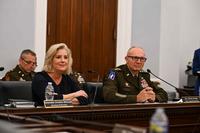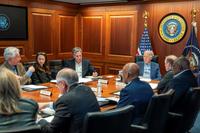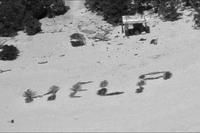Many of those heart-rending tributes to the troops at ballparks and football stadiums came with a pricetag to the Defense Department for well-planned public relations efforts to boost recruiting and funding to the military, two senators charged Wednesday.
"Americans deserve the ability to assume that tributes for our men and women in military uniform are genuine displays of national pride, which many are, rather than taxpayer-funded DOD marketing gimmicks," Sens. John McCain and Jeff Flake, both Republicans of Arizona., wrote in a report on the practice.
In a 150-page report titled "Tackling Paid Patriotism," McCain, chairman of the Senate Armed Services Committee, and Flake, a member of the Appropriations Committee, cited numerous instances of the military paying for tributes at professional and college sports events.
The report began by citing a 2013 Atlanta Falcons pro football game at which 80 National Guard members unfurled a huge U.S. flag on the field of the Georgia Dome.
"Little did those fans -- or millions of other Americans -- know that the National Guard had actually paid the Atlanta Falcons for this display of patriotism as part of a $315,000 marketing contract," the report said.
Other instances of "paid patriotism" cited in the report included:
- $49,000 to the Milwaukee Brewers for the Wisconsin Army National Guard to sponsor each Sunday performance of "God Bless America" during home games with announcement and logo recognition on the video board.
- $1,509 for the LA Galaxy (soccer) to provide pre-game recognition of five high ranking officers of the Air Force and 100 general admission tickets to that game.
- $20,000 to the New York Jets to recognize one-to-two New Jersey Army National Guard soldiers as hometown heroes at each home game on the videoboard and Coaches Club access for the recognized soldier(s) and three guests.
The report also cited instances where the military appeared to be engaged in activities unrelated to marketing and was simply buying tickets and access in what the two senators charged were "taxpayer-funded boondoggles" aimed at securing "VIP perks":
- The Air Force paid the Cincinnati Bengals nearly $5,000 for 60 club-level tickets.
- The National Guard paid the Indianapolis Colts for use of a luxury suite, autographed items, pre-game field visits and cheerleader appearances.
- The National Guard paid the Boston Bruins for a luxury box for 18 people and an executive view suite for 25 people on military appreciation night.
"In fact, these displays of paid patriotism are included within the $6.8 million that the Department of Defense (DOD) has spent on sports marketing contracts since Fiscal Year 2012," the report said.
"While many professional sporting teams do include patriotic events as a pure display of national pride, this report highlights far too many instances when that is simply not the case," the report said. McCain and Flake called on pro sports teams which accepted DOD money for questionable events to donate sums in that total to worthy causes supporting troops and veterans.
Numerous critics have pointed to patriotic displays at sporting events as a sign of the growing rift in American society, often cited by the military itself, between civilians and the so-called "one percent" who serve in uniform.
In her book "No Man's Land," West Point literature professor Elizabeth D. Samet, wrote of the alienation of a generation in the ranks who became "war commuters" to Iraq and Afghanistan, and now has difficulty distinguishing between being "over there" and "over here." She cited the bafflement of many troops at the aimless "thank you for your service" encounters with civilians on the street.
The nation is "characterized by a state of knowing and not knowing we are at war," Samet wrote. As a result, "we seem largely unable to respond to returning soldiers with anything more substantive than histrionic gestures typified by the now obligatory phrase: 'Thank you for your service.'"
Retired Army Col. Andrew Bacevich, a West Point graduate and Vietnam veteran, found such a gesture at Fenway Park in Boston on the 4th of July in 2011 at a baseball game between the Red Sox and Toronto.
In a scathing op-ed for the Washington Post, Bacevich called a homecoming tribute to a sailor at the game a "masterpiece of contrived spontaneity." He said "the event leaves spectators feeling good about their baseball team, about their military, and not least of all about themselves -- precisely as it was meant to do."
Cheering for the troops at the ballpark was a cheap and easy way for Americans to meet whatever they felt as their civic duty in a nation at war, said Bacevich, a Boston University professor whose son, Army 1st Lt. Andrew J. Bacevich, was killed in Iraq.
"Fulfilling that obligation has posed a challenge, however," Bacevich wrote. "Rather than doing so concretely, Americans -- with a few honorable exceptions -- have settled for symbolism."
"With their pronounced aversion to collective service and sacrifice (an inclination indulged by leaders of both political parties), Americans resist any definition of civic duty that threatens to crimp lifestyles."
--Richard Sisk can be reached at Richard.Sisk@military.com.



























